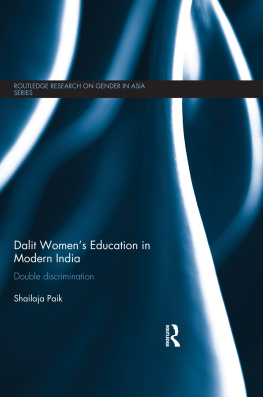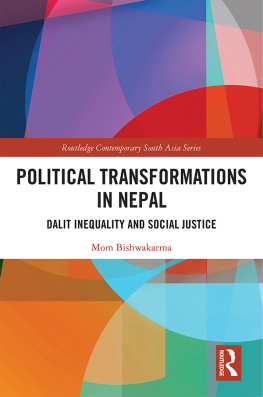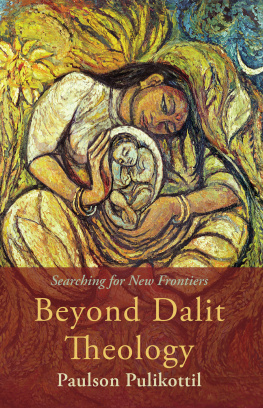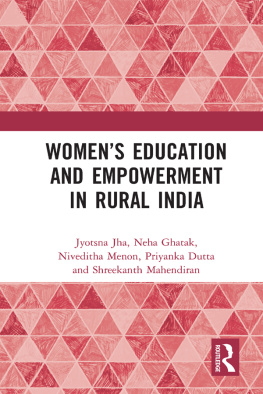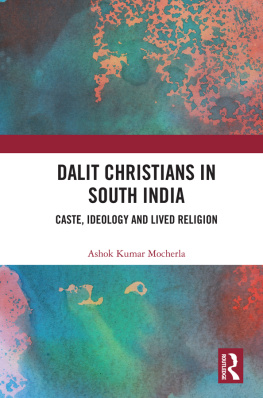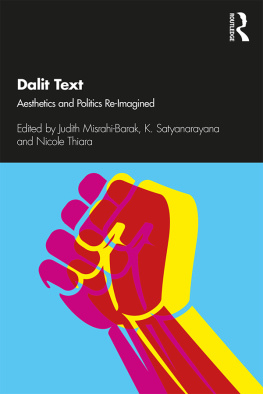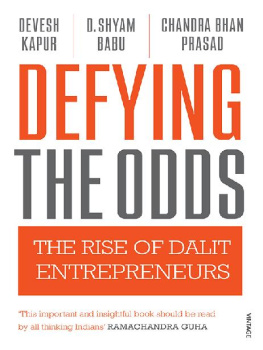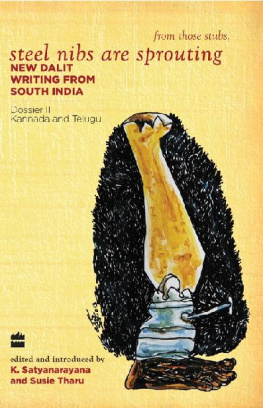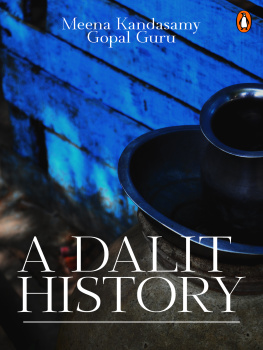Shailaja Paik centers her history of western Indian Dalit women in the highly charged political field of education, which was a testing ground for Dalit self-realization in the context of colonial and postcolonial modernity. Drawing on a rich archive of oral history and insisting on gender as a generative force in the shaping of all Dalit experience, she documents the ways that Dalit women made history through their struggle with the state and the community itself. This doubleness was both the condition of their radical history and the limits of its horizon. Readers will feel the contradiction of that double bind even as they come to appreciate the variety of obstacles Dalit women faced as they took up the daily challenges of getting on and [getting] out from under.
Antoinette Burton, University of Illinois
Shailaja Paiks study of education among Dalit women in urban Maharashtra is a ground-breaking contribution to historical work on caste and gender in South Asia. Based upon extensive oral interviews as well as exhaustive archival research, Paiks book provides critical analysis of a broad range of important historical concerns, including the limitations of the colonial and post-colonial educational systems, the failure of pre-independence feminists in addressing concerns of low-caste women, the views of B.R. Ambedkar and other Dalit radicals on education and gender, and the ways education transformed and failed to transform the professional and familial lives of Dalit women.
Douglas E. Haynes, Dartmouth College
Shailaja Paik examines the double discrimination faced by Dalit women in India when they strive, against many odds, to make the most of whatever educational facilities there are available to them. They are discriminated against both as members of a stigmatised community, and also as women. While the caste-based prejudice comes from outside the community, the gender-based prejudice comes too frequently from within, as male Dalits routinely devalue and curb the potential of female members of their families. This history of such discrimination cannot be studied adequately through written records, as it is largely an unrecorded one it depends very centrally on the collection of womens narratives through interviews. Dr. Paik has carried out this task with energy and great commitment, revealing a fine empathy with those with whom she engaged. The result is a path-breaking and important piece of research and writing.
David Hardiman, University of Warwick
Shailaja Paiks Dalit Womens Education in Modern India stands out for putting the everyday experience of ordinary Dalit women in western India at the center of her analysis of Dalit access to education in the twentieth century. Drawing on a rich archive of English and Marathi sources, including oral histories, Paik provides an account of Dalit womens navigation of the hierarchies of gender, caste, class, power, and privilege. The triumphs and tribulations of Dalit women who both seized and challenged the new educational opportunities makes for a compelling narrative attentive to the inequities within upper-caste as well as Dalit communities.
Mrinalini Sinha, University of Michigan
Shailaja Paik gives us a very clear look at education, what it means, how Dalits enter into it and how negotiable their attitude about education is. The longstanding Mahar/Mang comparison has been expanded in very interesting ways. Of her many topics two that are most unusual are in-depth studies of middle-class Dalits. Usually the middle class is dismissed as a minor percentage of Untouchables who have managed to climb into the middle class. Shailaja deals with it very seriously. It is probably one of the very few reports we have. She has given us a multi-faceted study of discrimination in terms of the field of education. The reformers, from B.R. Ambedkar and Mahatma Phule down to the present, have all stressed education as the key to progress. Shailaja has much to offer to the field of education and women.
Eleanor Zelliot, Carleton College
Shailaja Paiks book deals with an understudied subject, Dalit womens education. It covers pre- and post-1947 developments by relying on rich sources archival and oral. During the Raj (and sometimes after!) Dalit women suffered from dual discrimination since they were neither welcome in the public schools though these institutions were supposed to be for all children nor necessarily sent to them by their parents. But some of them, in Maharashtra, seized the opportunity of their migration to the city to follow Ambedkars recommendation, Educate. Paiks remarkable exercise in ethno-history meticulously highlights the many faces of segregation based on language and location, as evident from her tale of two cities which shows that to live in a slum of Poona implied more than a mere topographical periphery. Last but not least, Dalit Womens Education in Modern India argues that education did not always give jobs to women sometimes because they married too young, sometimes because nobody wanted to hire them: a strong plea for job reservations, one of the major achievements of India.
Christophe Jaffrelot, Kings College, London
Dalit Womens Education in Modern India
Inspired by egalitarian doctrines, the Dalit communities in India have been fighting for basic human and civic rights since the middle of the nineteenth century. In this book, Shailaja Paik focuses on the struggle of Dalit women in one arena the realm of formal education and examines a range of interconnected social, cultural and political questions. What did education mean to women? How did changes in womens education affect their views of themselves and their domestic work, public employment, marriage, sexuality and childbearing and rearing? What does the dissonance between the rhetoric and practice of secular education tell us about the deeper historical entanglement with modernity as experienced by Dalit communities?
Dalit Womens Education in Modern India is a social and cultural history that challenges the triumphant narrative of modern secular education to analyse the constellation of social, economic, political and historical circumstances that both opened and closed opportunities to many Dalits. By focusing on marginalised Dalit women in modern Maharashtra, who have rarely been at the centre of systematic historical enquiry, Paik breathes life into their ideas, expectations, potentials, fears and frustrations. Addressing two major blind spots in the historiography of India and of the womens movement, she historicises Dalit womens experiences and constructs them as historical agents. The book combines archival research with historical fieldwork, and centres on themes including slum life, urban middle classes, social and sexual labour, and family, marriage and children to provide a penetrating portrait of the actions and lives of Dalit women.
Elegantly conceived and convincingly argued, Dalit Womens Education in Modern India will be invaluable to students of History, Caste Politics, Women and Gender Studies, Education Studies, Urban Studies and Asian Studies.
Shailaja Paik is Assistant Professor of History at the University of Cincinnati, USA.
Routledge research on gender in Asia series
1 Women, Identity and Indias Call Centre Industry
JK Tina Basi
2 Feminist Research Methodology
Making meanings of meaning-making
Maithree Wickramasinghe
3 Sex Trafficking in South Asia
Telling Mayas story
Mary Crawford
4 Religion, Gender and Politics in Indonesia
Disputing the Muslim body
Sonja van Wichelen
5 Gender and Family in East Asia
Edited by Siumi Maria Tam, Wai-ching Angela Wong and Danning Wang

